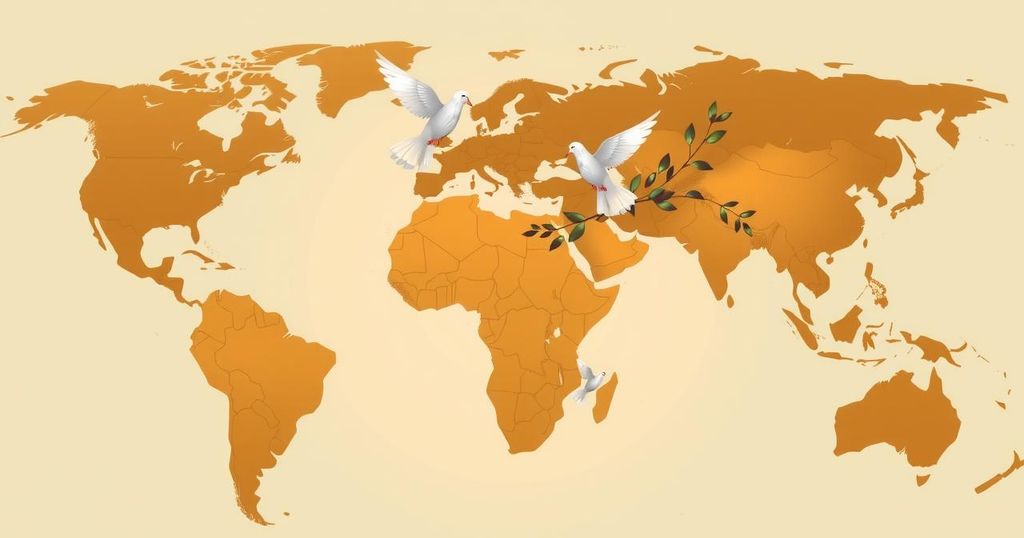The Silent Genocide: A Call for American Leadership and Israeli Action in Sudan’s Crisis
Sudan is experiencing a severe humanitarian crisis marked by ethnic genocide and mass displacement, yet major international powers have been largely unresponsive. The U.S. and Israel must acknowledge the risks posed by Sudan’s destabilization. A coordinated global action is essential to address the ongoing tragedy and prevent further escalation. Without intervention, the crisis will continue to spiral, impacting both local and global security.
Sudan is currently facing a catastrophic humanitarian crisis marked by ethnic genocide, mass killings, and over 10 million individuals displaced due to ongoing civil conflict. The violence has persisted for nearly a year, yet powerful nations, including the United States and Israel, have largely remained uninvolved, instead prioritizing conflicts that align with their immediate geopolitical interests.
Since April 2023, fierce fighting between the Sudanese Armed Forces (SAF) and the paramilitary Rapid Support Forces (RSF) has wrought devastation across Sudan, particularly in the Darfur region. The genocide against the non-Arab Masalit community in West Darfur has been formally recognized by the United States as of January 2025. Reports cite widespread killings, sexual violence, and targeted assaults against civilians, resulting in tens of thousands of deaths and creating a dire refugee crisis that neighboring countries are ill-equipped to handle.
Despite these harrowing events, international response has been grossly inadequate, with the U.S., traditionally a leader in humanitarian intervention, diverted by other geopolitical issues. While symbolic statements of condemnation have emerged, substantial actions remain conspicuously absent. The continuing neglect of Sudan’s plight carries significant risks that may destabilize not only Sudan but also the wider region, leading to increased extremism and compromised global security.
The destabilization of Sudan threatens to exacerbate jihadist activity and arms trafficking, potentially impacting critical regions tied to global security. The U.S. must acknowledge that a collapse in Sudan will undermine stability in the Horn of Africa, heighten threats from extremist groups, and disrupt vital trade routes within the Red Sea, crucial for international commerce.
For Israel, the implications of Sudan’s crisis are particularly acute. Given Israel’s longstanding emphasis on security within the Middle East, Sudan’s decline poses serious risks. The nation’s previous engagement in the Abraham Accords in 2020 positioned it favorably against extremism; however, with Sudan now in chaos, Israel risks losing a strategic ally.
The Abraham Accords represented a significant diplomatic achievement, promoting stability and collaboration against Iranian influence and other radical elements. As Sudan spirals into chaos, the opportunity for cooperation diminishes, leaving potential for extremist groups to gain footholds in a region already beset by radicalization. The fallout from this instability could destabilize key Israeli ally Egypt and further compromise Israeli security.
The conflict has attracted significant external intervention, particularly from Gulf nations like the UAE, which allegedly supports the RSF. Sudan has even filed a case against the UAE at the International Court of Justice for purported engagement in financing and arming the RSF. Such external involvement has intensified the conflict, enabling the RSF’s campaign of genocide to proceed unchecked.
The geopolitical dynamics surrounding Sudan’s crisis highlight a broader struggle among regional and global powers, raising significant concerns regarding extremist group proliferation. Israel’s relations with Gulf states complicate matters further, necessitating careful navigation of alliances to maintain regional stability and counteract the threats posed by unrest in Sudan.
The United States must take proactive steps in leading an international response to the crisis in Sudan. By leveraging its influence, the U.S. can help galvanize global action, push for diplomatic pressure on Sudan’s leadership, and foster multilateral peace initiatives. Collaborating with Israel, the United Nations, and regional stakeholders, the U.S. can form a coalition aimed at addressing the ongoing genocide and restoring order in Sudan.
A decisive international response is critical; the U.S. must commit to meaningful involvement, including sanctions, peacekeeping initiatives, humanitarian assistance, and diplomatic strategies for political resolution. Without such sustained efforts, the crisis in Sudan threatens to escalate further, inflicting additional harm on its people and destabilizing the broader region.
The ongoing humanitarian catastrophe in Sudan requires immediate global attention and action. The silence of major powers such as the United States and Israel in the face of ethnic genocide and widespread atrocities is alarming. It is imperative that a coordinated international response be established to prevent further escalation, restore stability, and protect the affected populations. As Sudan’s crisis affects regional and global security, it presents an urgent call to action for human rights and humanitarian intervention.
Original Source: www.ynetnews.com




Post Comment